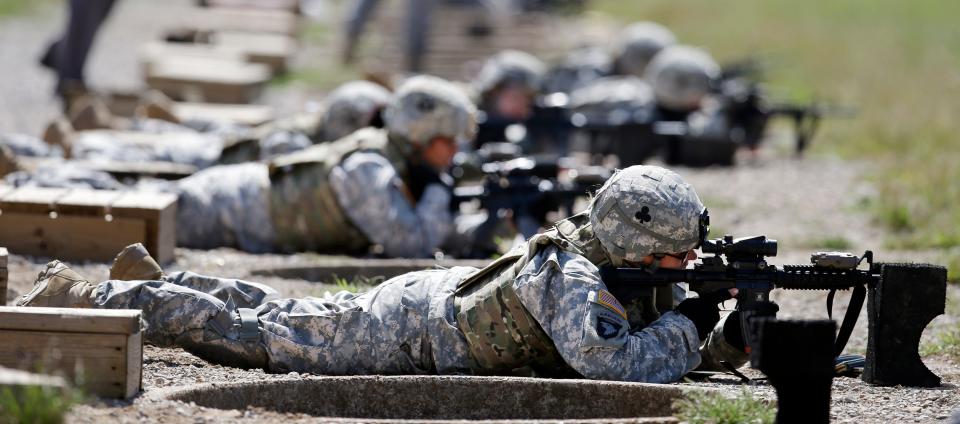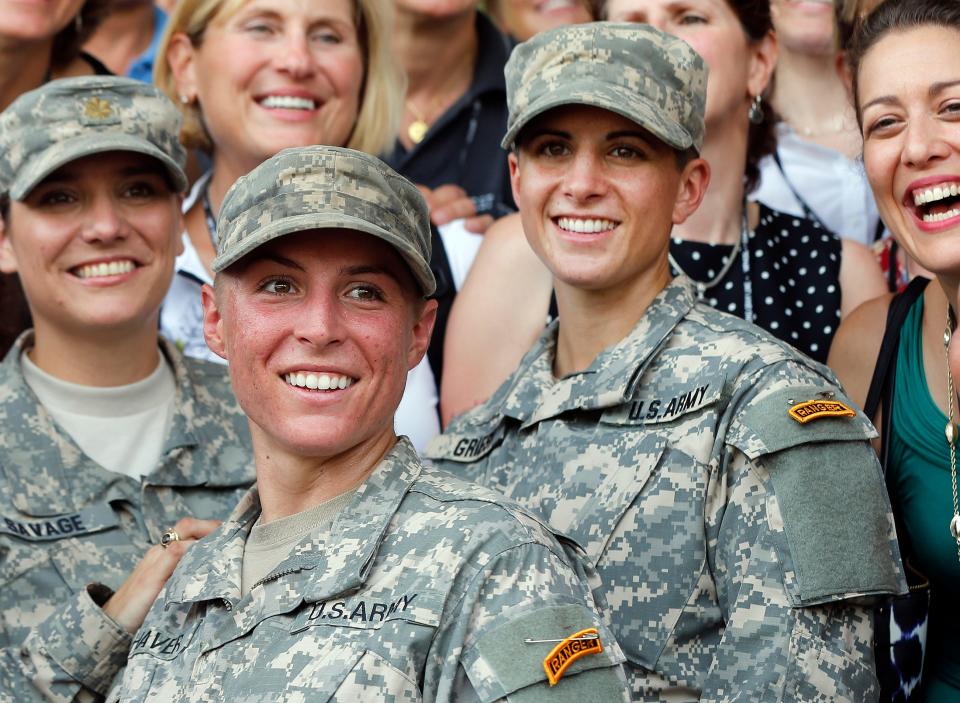Men-only military draft is a vestige of anti-women bias. Supreme Court should strike it down.
- Oops!Something went wrong.Please try again later.
Congress and the courts have eliminated nearly every sex-based distinction in federal law, with one significant exception: The Military Selective Service Act.
This law requires all male-born citizens and residents ages 18 and 26 to register for the draft or face five years in prison, a $250,000 fine, the loss of student loans and a felony record. Women are exempt.
The draft is the government’s most powerful tool to provide for the national defense. The United States drafted nearly 3 million people in World War I, more than 10 million in World War II, about 1.5 million in the Korean War, and over 1.8 million in the Vietnam War. All draftees were men.
When President Jimmy Carter proposed to equalize the Selective Service law in 1980, Congress refused, finding that “drafting women would place unprecedented strains on family life” by requiring young mothers to serve while fathers at home took care of the family.
In 1981, the Supreme Court upheld the law. Because only men were eligible to serve in combat, and the “purpose of registration was to prepare for a draft of combat troops,” the court found that men and women were “simply not similarly situated” for the draft.
In dissent, Justice Thurgood Marshall called the law “one of the most potent remaining public expressions of ancient canards about the proper role of women.”

Women have died in combat for USA
But times have changed. In 2013, the Department of Defense lifted the ban on women in combat. In 2015, the department opened all career fields to women, without exception.
Women now make up 17% of the military, including as Army Rangers, as Green Berets, in combat aircraft and aboard Navy submarines. Since Sept. 11, 2001, more than 300,000 women have deployed to Iraq and Afghanistan. Women in combat roles have died for this country.

Faced with the politically unpalatable prospect of expanding draft eligibility, Congress has dithered. Enter the ACLU and the National Coalition for Men, which now ask the Supreme Court, again, to declare the law unconstitutional. The Biden administration has asked the court to wait for Congress to act.
Middle East: Israel-Gaza violence shows Middle East conflict no ‘real-estate dispute’
Forty years is long enough. The Supreme Court should take the case and strike down this antiquated law.
The Military Selective Service Act discriminates against men, by imposing obligations, burdens and penalties that only men face. The law discriminates against women by treating them as less than full citizens, conveying that women are less willing and able to defend the country, and perpetuating paternalistic stereotypes that, as Justice William Brennan once put it, “put women, not on a pedestal, but in a cage.”
Undermining military preparedness
The law also undermines military preparedness. Opponents of selective service equality argue that men are on average bigger, stronger and faster than women and therefore more able to fill combat roles. But nearly 80% of military positions are noncombat roles: intelligence and communication specialists, data scientists, linguists, logisticians, network engineers, medical personnel, cloud security specialists, drone or cyber operators, and satellite communications engineers.
As retired Gens. Michael Hayden and Stanley McChrystal have written, to deprive our military of half the talent and ability of the population during a potential national emergency is folly.
SUBSCRIBE: Help support quality journalism like this.
Should we have a draft at all? Congress will have to decide. If the court strikes down the law, Congress could expand draft eligibility to include women, convert the draft to a national service requirement or abolish the draft altogether. Let’s have that vigorous debate when everyone – men, women, parents of sons and daughters – has a stake.
As a civil rights lawyer, I proudly represent women and men in discrimination, harassment and other #MeToo cases. But we cannot achieve equality while federal law makes men soldiers and women partial citizens.
Capitol attacks: America deserves the facts about the Capitol attack, whether Republicans like it or not

Justice Ruth Bader Ginsburg famously supported men in her quest for gender equality: a widower seeking his late wife’s social security benefits, a single man denied a tax deduction to care for his elderly mother, even a young man who wanted to buy 3.2% beer. These cases helped pave the way for substantial (if still incomplete) social, economic and political progress for women.
I have no doubt what RBG would do today. She would stand for equality.
We should, too.
Ilann M. Maazel is a partner at Emery Celli Brinckerhoff Abady Ward & Maazel in New York City. Follow him on Twitter: @imaazel
You can read diverse opinions from our Board of Contributors and other writers on the Opinion front page, on Twitter @usatodayopinion and in our daily Opinion newsletter. To respond to a column, submit a comment to letters@usatoday.com.
This article originally appeared on USA TODAY: Military draft: Supreme Court should end sexist law

